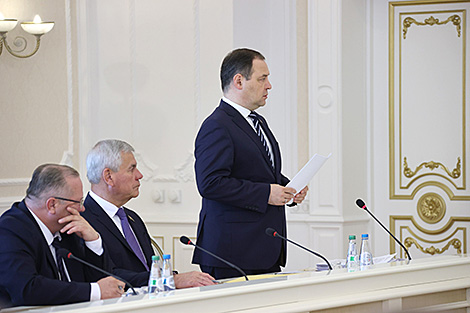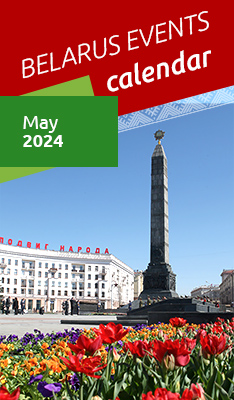Business news
Prime minister explains new business terms, preferences Belarus about to offer to investors

MINSK, 22 June (BelTA) – After Belarus President Aleksandr Lukashenko hosted a conference with senior members of the Council of Ministers on 22 June, Prime Minister of Belarus Roman Golovchenko explained what innovations are supposed to be introduced by the new corresponding bill, BelTA has learned.
A bill on facilitating and stimulating the realization of investment projects was submitted for consideration of the head of state. The document is supposed to replace Ordinance No.10, which represented a breakthrough back in the day and served as the legal foundation for this sphere for nearly 15 years. “The ordinance on investments was one of the most advanced and progressive pieces of legislation in our region definitely if not the world. And it produced a tangible effect from the point of bringing investors and setting up new manufacturing facilities. Unfortunately, it is impossible to patent an ordinance. This is why many neighbors of ours started using the Belarusian know-hows the ordinance stipulated. Certainly, after a certain period of time we need to consider what other tools we use in order to keep investments coming,” the prime minister explained.
Both international practice and the experience of neighboring countries were taken into account in the course of the bill’s development. “It seems to me the government has managed to find the anchors that will allow bringing new investors to Belarus,” Roman Golovchenko said.
At the same time bringing just any kind of investors to Belarus is not the idea. The country gets plenty of investments, the prime minister stressed. The head of state pointed it out during the government conference. “Instead of coming here as they said in the past and squeezing everything out of the people, squeezing everything they can and paying peanuts to workers, let’s say, $500 while not paying taxes at all. While taking most of the profits in the form of dividends to unfriendly countries. I don’t think we need such projects,” Aleksandr Lukashenko stressed. “They should not approach Belarus like a banana republic. They should treat Belarus like a normal, high-tech and highly developed country. And we should primarily work with our own investors.”
Roman Golovchenko explained: “The situation with foreign direct investments in Belarus is not bad. But we need investors for the spheres that the economy needs right now.” For instance, Belarus certainly could use investments in trade and in food production but there is no need to enable some special conditions for them. The current conditions are sufficient.
But Belarus is interested in bringing new high-status investors to the pharmaceutical industry. More than 50% of the medications available in Belarus are of Belarusian make, but an ambitious task has been formulated: the share of Belarusian medications has to be raised to 70%. New investment projects will help with that.
Roman Golovchenko noted that according to the current international practice investors, who start operating in pharmaceutical industry, are promised guaranteed sales of their products (offset contracts). “It is the established practice in this line of work. We don’t have this norm in legislation for now,” the prime minister remarked. “Granting this right to an entire range of investment agreements was suggested. Certainly, when it is advantageous for the state. Investors will rest assured that they will have guaranteed demand for their products.”
Another novelty the bill stipulates is building long-range communication networks for an investment project at the expense of the state. It is particularly topical for parts of the country, which are far from major cities and lack communication lines for a powerful manufacturing enterprise. “We believe it will also give a powerful boost to the realization of such projects, particularly in Belarus’ regions,” Roman Golovchenko said.
Fiscal transfers to compensate for some of investment costs represent another initiative of the government. “This practice is used as well. In Belarus it is realized within the framework of the government program on agribusiness. If an agricultural enterprise or a processing industry enterprise is built, the state budget compensates the investor for some of the costs once construction is over and for another part of the costs once the enterprise reaches the designed output capacity. It is an interesting option for investors because the investor will receive so-called cashback from the state right away in exchange for promptly and effectively realizing the project,” the head of government explained.
Another innovation suggests granting district administrations the right to sign investment agreements. It will help fulfill the president’s instruction to implement at least one investment project per district.
“On the whole, the head of state had a favorable view of the bill. Certain instructions were given to polish the norms and forward it to the parliament according to the established procedure,” Roman Golovchenko summarized.







 print version
print version make home page
make home page add to bookmarks
add to bookmarks

